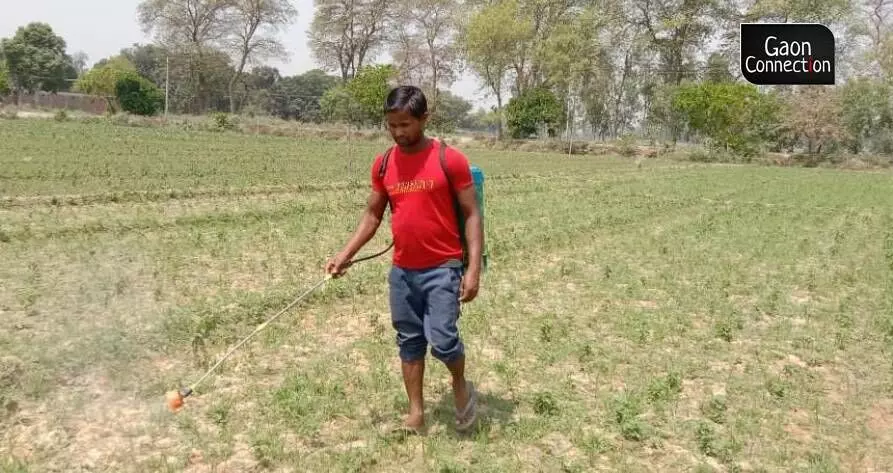Peppermint farmers in UP lose their cool as the rising heat brings more pests that threaten the cash crop
India is the leading exporter of peppermint oil in the world, and Uttar Pradesh accounts for 85 per cent of the country's total acreage. Barabanki district alone cultivates 33 per cent of the state's total peppermint, a viable cash crop for the district. But early heat waves and the damaging easterly winds have increased expenses for the cultivators, and the risk of crop damage looms large.
 Virendra Singh 6 May 2022 3:45 PM GMT
Virendra Singh 6 May 2022 3:45 PM GMT

According to the state's Department of Horticulture and Food Processing, the cultivation is spread across 88,000 hectares of land and Barabanki alone contributes about 25 per cent to 33 per cent of the total peppermint oil production. All photos by Virendra Singh
Rewa Ratanpur, Barabanki (Uttar Pradesh)
Janardan Varma has been cultivating mentha (peppermint) for decades but the challenges in protecting his crop have never been as many as they are in the ongoing season.
"It feels as if all the forces in nature have conjured up to wreak havoc on my mentha. The summer temperatures have never been this high, garam hawayen (heat waves) are scorching the earth like never before, these hot winds used to arrive in May-June but this year I have been witnessing them since the early weeks of April itself," the middle aged farmer who owns about a couple of hectares of land in Barabanki's Lalapur village told Gaon Connection.
"Also, there are too many pests feeding on my crop. I fear that I might have to incur losses this year," the 42-year-old farmer said.
The farmer informed Gaon Connection that it is vital for the peppermint crop to maintain moisture in order to ensure its freshness and smell but higher temperatures and heat waves have increased the demand of irrigation.
"The cost of cultivating mentha is almost Rs 20,000 per acre. But so far, I have spent almost Rs 35,000 per acre of field. In total, almost Rs 160,000 have been spent on the crop so far and there are still two months left for its harvest. Farmers are really scared this time," Verma added.
According to the state's Department of Horticulture and Food Processing, the cultivation is spread across 88,000 hectares of land and Barabanki alone contributes about 25 per cent to 33 per cent of the total peppermint oil production.
'Easterly winds led to increase in insects'
In Barabanki's Ratan Purwa village which is situated at a distance of about 10 kilometers from Verma's village, Pradeep Kumar agreed with what the other farmer told Gaon Connection.
"Things are unprecedented this time. I have never ever seen such swarms of insects and pests in the fields. It is because of the pachhua hawa (easterly winds) blowing this time. Even if I leave my fields unattended for about three-four days, it is possible that my entire crop will be eaten by these obnoxious insects," Pradeep Kumar Gautam said in an agitated voice.
"The costs incurred on pesticides have soared like never before. The plantation is hardly a month old. If I don't protect it now, chances are that I will most likely harvest a loss in June-July," he added.
Ramesh Chandra Verma, another farmer from Barabanki pointed out that spraying pesticides for once repels the pests merely for a week. But this time, the pests are found to be infesting much before a week's time.
Ramesh Chandra Verma
"Their (pests') numbers are too much this time. Also, it seems the pesticides are not having the desired effect on them. All this has soared the costs for the farmers who have to buy more pesticides to protect their mentha crop," he said.
'Desist from use of chemical pesticides'
Meanwhile, the chief scientist at Lucknow-based Central Institute of medicinal and Aromatic Plants (CIMAP) pointed out that a further increase in pesticides is likely to adversely affect the immunity of the plants which can be a far bigger problem in future.
"The required dosage to check the population explosion of the insects and pests have almost doubled. In such a situation, spraying these chemical pesticides can be detrimental to the farmers as their crops will become immunologically weak and will sustain greater damage. Farmers are advised to prefer organic insecticides to prevent their mentha crops," Sanjay Kumar told Gaon Connection.
Providing further details on the pest attacks on the mentha crop, District Crop Safety Officer in Barabanki told Gaon Connection that the insect which is primarily responsible for the ongoing damage in the crops is Castor semi-looper which is locally known as Gadehla.
"This insect is a brownish, green or a black coloured worm which feasts on the mentha leaves. This insect remains hidden during the day and eats the leaves of the plants at night," Priti Kiran Bajpayi told Gaon Connection.
She advised the farmers that they should use a mixture of following: Quinalphos (25 per cent), Imidacloprid (17.8 per cent), Chlorpyrifos (20 per cent), Emamectin benzoate (five per cent) with 600 litres to 800 litres of water for a hectare of field to protect their crop from pests.
"It should be ensured that the fields are moist before spraying these chemicals and ideally it should be done in the morning before sunrise or in the evening after sunset," she added.
Meanwhile, Kumar, the senior scientist at CIMAP told Gaon Connection that the total acreage of the mentha crop is around 325,000 hectares while Uttar Pradesh alone accounts for 275,000 of the nationwide acreage. In Uttar Pradesh, Barabanki alone accounts for almost one-third of the total production while other districts which significantly produce the peppermint crop are Sitapur, Gonda, Sultanpur, Badaun, Bareilly, Raebareili, Sambhal, Orai, Shahjahanpur and Lakhimpur. He also informed that gradually, Punjab, Bihar and Haryana are also ensuring a gradual increase in mentha production.
More Stories




